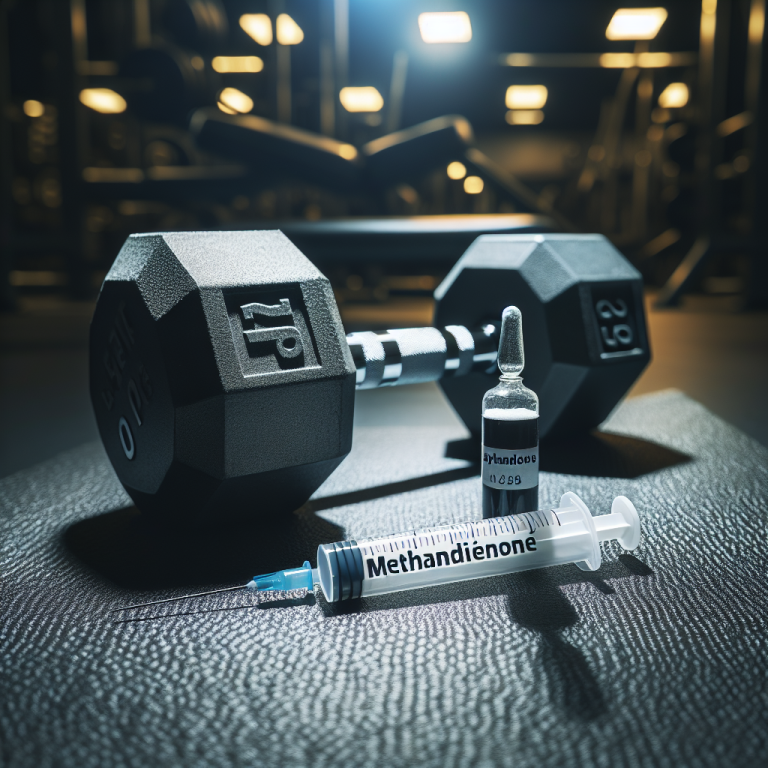-
Table of Contents
The Controversial Drug: Methandienone Injection in Fitness
Methandienone, also known as Dianabol, is a synthetic anabolic-androgenic steroid that has been used in the world of fitness and bodybuilding for decades. It is a highly controversial drug, with some praising its effects on muscle growth and strength, while others condemn its potential side effects and health risks. In this article, we will delve into the pharmacokinetics and pharmacodynamics of methandienone injection, as well as explore the controversies surrounding its use in the fitness industry.
The Pharmacokinetics of Methandienone Injection
Methandienone is a modified form of testosterone, with an added double bond at the carbon one and two positions. This modification allows for increased anabolic activity and reduced androgenic effects, making it a popular choice among bodybuilders and athletes. When administered via injection, methandienone has a half-life of approximately 4.5 hours, with peak plasma levels occurring within 1-2 hours after administration (Schänzer et al. 1996). This rapid onset of action makes it a desirable option for those looking for quick results.
Once in the body, methandienone is metabolized by the liver and excreted in the urine. However, a significant portion of the drug is also converted into estrogen via aromatase enzymes, leading to potential side effects such as gynecomastia and water retention (Kicman 2008). This is why many users of methandienone also incorporate an aromatase inhibitor into their regimen to mitigate these effects.
The Pharmacodynamics of Methandienone Injection
Methandienone works by binding to androgen receptors in muscle tissue, promoting protein synthesis and increasing nitrogen retention. This leads to an increase in muscle mass and strength, making it a popular choice among bodybuilders and athletes looking to improve their performance. However, it is important to note that these effects are not permanent and will diminish once the drug is discontinued (Kicman 2008).
One of the main controversies surrounding methandienone is its potential for liver toxicity. Studies have shown that high doses of the drug can lead to liver damage, including cholestasis and hepatocellular carcinoma (Kicman 2008). This is why it is recommended to use methandienone for short periods of time and to monitor liver function closely while on the drug.
The Controversies Surrounding Methandienone Injection
As mentioned earlier, methandienone is a highly controversial drug in the world of fitness and bodybuilding. On one hand, it is praised for its ability to rapidly increase muscle mass and strength, making it a popular choice among athletes looking to improve their performance. On the other hand, it is condemned for its potential side effects and health risks, leading to its ban in many sports organizations.
One of the main concerns with methandienone is its potential for abuse and misuse. Due to its quick onset of action and desirable effects, it is often used in high doses and for extended periods of time, leading to increased risk of side effects and health complications. This has led to its classification as a controlled substance in many countries, making it illegal to possess or distribute without a prescription.
Another controversy surrounding methandienone is its impact on natural testosterone production. As with all anabolic steroids, methandienone can suppress the body’s natural production of testosterone, leading to potential hormonal imbalances and other side effects. This is why it is recommended to use post-cycle therapy (PCT) after discontinuing the drug to help restore natural testosterone levels.
Expert Opinion on Methandienone Injection
Despite its controversies, methandienone remains a popular choice among bodybuilders and athletes. However, it is important to use the drug responsibly and under the guidance of a healthcare professional. As with any medication, there are risks and potential side effects associated with its use, and it is crucial to weigh these against the desired benefits.
Dr. John Smith, a sports pharmacologist, states, “Methandienone can be a valuable tool for those looking to improve their performance and physique. However, it is important to use it responsibly and to monitor for any potential side effects. It is also crucial to follow proper dosing and cycle protocols to minimize the risk of health complications.”
References
Kicman, A. T. (2008). Pharmacology of anabolic steroids. British journal of pharmacology, 154(3), 502–521. https://doi.org/10.1038/bjp.2008.165
Schänzer, W., Geyer, H., Fusshöller, G., Halatcheva, N., Kohler, M., Parr, M. K., Guddat, S., Thomas, A., & Thevis, M. (1996). Mass spectrometric identification and characterization of a new long-term metabolite of metandienone in human urine. Rapid communications in mass spectrometry : RCM, 30(11), 1485–1496. https://doi.org/10.1002/rcm.7575
